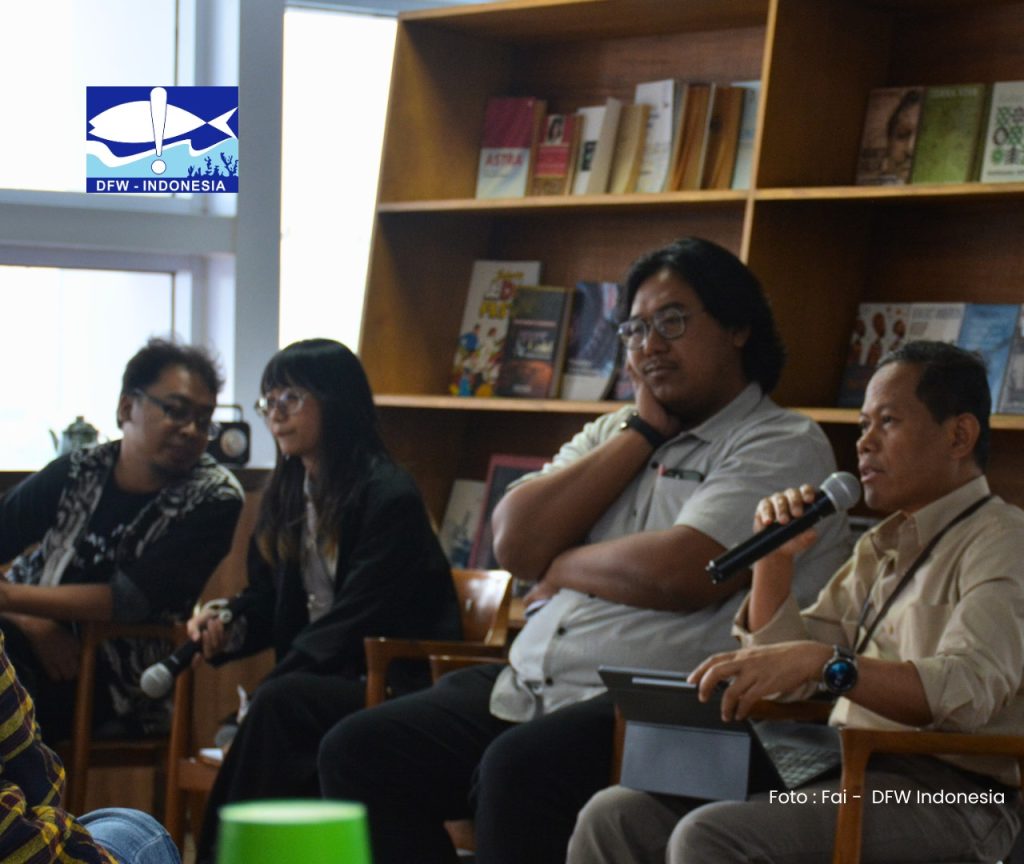Jakarta, 19th September 2025 – In the past four years, the fisheries sector has played an important role in realizing Indonesia’s blue economy vision. This is evidenced by the increase in exports of Indonesian fishery products from USD 4.56 billion in 2021 to USD 4.81 billion during the January–October 2024 period, or an average annual increase of around 1.8%. This increase in fishery product exports has also been supported by workers in seafood processing plants, who play a crucial role in the fisheries industry chain. Since 2023, Destructive Fishing Watch (DFW) Indonesia has been working with various stakeholders to implement a fisheries labor protection program in Jakarta, Bali, and North Sulawesi.
To support efforts to protect fishery workers, DFW Indonesia has collaborated with the Directorate General of Strengthening the Competitiveness of Marine and Fishery Products, Ministry of Marine Affairs and Fisheries, to conduct a rapid assessment on the conditions of tuna processing workers in Jakarta, Bali, and North Sulawesi since May 2025. As part of the dissemination process, DFW Indonesia held a Discussion: Conditions of Tuna Processing Workers in Bitung, Benoa, and North Jakarta to gather input from various stakeholders on this issue. “This research is one of our efforts to address the issue of fisheries labor protection, especially for workers in seafood processing plants,” said Imam Trihatmadja, Program Director of DFW Indonesia.
Nabila Tauhida, Human Rights Officer at DFW Indonesia, stated that seafood processing workers work with a high level of flexibility. According to her presentation, this flexibility is reflected in the ease with which workers move from one factory to another.This pattern of flexibility is supported by short-term employment contracts (PKWT – Perjanjian Kerja Waktu Tertentu) lasting from 3 months to 1 year. “The implementation of short-term contracts is intended to match the production model, which is based on pre-orders,” she explained.
Nabila also explained that the labor-intensive tuna processing sector, which depends on order-based production, makes workers increasingly vulnerable. In the research conducted, one company was found to have laid off around 60% of its workers in response to Trump’s policy changes in early 2025. “The workers we encountered are in vulnerable positions. In fact, there were workers whose 3-month PKWT contracts were repeatedly extended for 6 years,” Nabila concluded. So, this research recommends strengthening labor supervision, especially in relation to the use of PKWT schemes as one of the recommendations of the research.
Read also : Di Balik Kilauan Ekspor, Nestapa Buruh Pabrik Perikanan Indonesia
In addition, Nabila found that workers still have limited space for representation. She noted the presence of a “chilling effect”, in which concerns over contract renewal make workers reluctant to voice their aspirations. According to her, this situation cannot be separated from production capacity, which is highly influenced by fluctuations in global market demand. “Workers are more worried about the certainty of their contracts than about issues of wages or occupational safety. They even become anxious when fish stocks decline, as this can affect the continuity of their contracts,” Nabila explained.
Responding to Nabila’s findings, Machmud, Secretary of the Directorate General of Strengthening the Competitiveness of Marine and Fishery Products (PDSPKP), said the ministry is currently committed to improving the capacity of processing workers through programs and technical training for both industries and workers. He stated that the workforce plays a key role in the fisheries production system because labor is the foundation of business productivity and the quality of the products produced. “The Directorate General of PDSPKP is ready to collaborate with all parties to improve the capacity of the workforce so they can contribute to strengthening the competitiveness of fishery products,” said Machmud.
Additionally, Yuli Adiratna, Director of the Labor Supervision System Development, Directorate General of Labor Supervision and Occupational Safety and Health (K3), Ministry of Manpower, emphasized the importance of reviewing laws and their implementation in the field. According to him, under the UU Cipta Kerja, a worker may only be employed under a PKWT (fixed-term contract) for a maximum of five years. “After that period, the worker must be employed under an Indefinite-Term Employment Agreement (PKWTT) or become a permanent worker,” Yuli explained.
Benni Hasbiyalloh, International Relations Lecturer at Paramadina University, commented on the research by pointing out that the uncertainty faced by seafood processing workers is one way business owners cut production costs. Benni, who also conducted similar research in the seafood processing sector, found that tuna factories can operate for a full year. “The work patterns found in this study need to be explored further, as they affect the recruitment process. On the other hand, we also need to examine whether tuna is a seasonal commodity, and whether the loin and canning processes influence recruitment. To do this, we must first break down the production process, because it will relate to how labor relations are formed,” Benni concluded.
Read also ; Survei DFW: Pengaruh Tarif Trump terhadap Ekonomi Perikanan Indonesia










